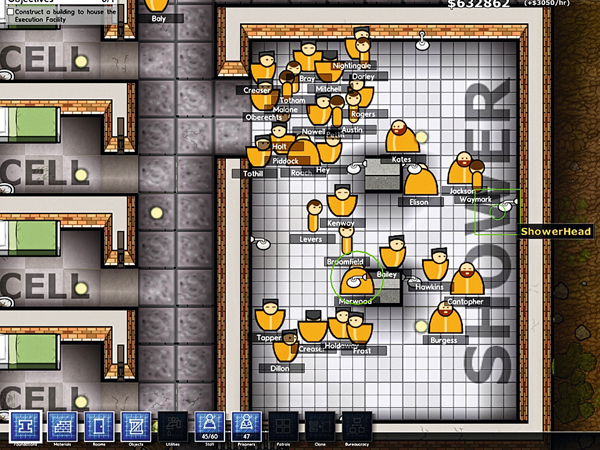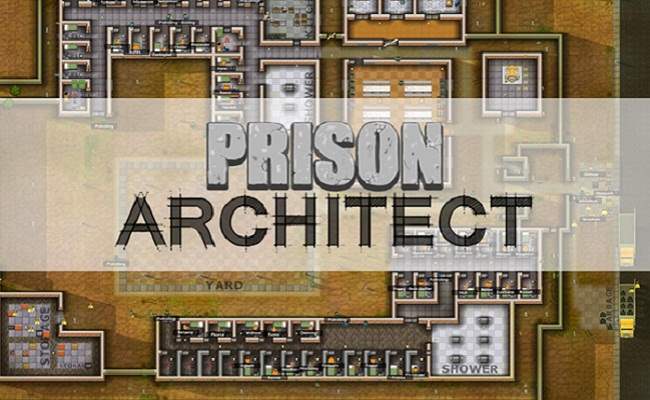I didn’t know much about Prison Architect before going to Eurogamer. The game from Introversion software (the brains behind Darwinia and Uplink) looks charmingly simple, with its almost Theme Park-but-better style graphics. However, after the developer sessions with Mark Morris and Chris Delay revealing the game’s intricacy, I was utterly obsessed about find out more.
The game – in which you design and manage prisons – gives players the most precise control over the prison. Design, waterpipes, electricity guard-stationing, riots, gates, and inmate happiness are just some of the things players will have to look out for. With the seemingly infinite amount of layers the game relies on, I caught up with lead designer Chris Delay to find out more and throw in a few of my visions for the game while I was at it.
Obviously it’s early days for the game yet (it’s still in the alpha build), but will the game feature some kind of system whereby your successes and failures have long-term consequences? For example your rep as a prison manager goes down if inmates start getting killed.
Chris: We actually have that system at the moment. It’s quite crude for now, but you get financial penalties when bad things happen. A prisoner escaping or getting murdered gets you a massive penalty. The prison has a valuation, that is affected not only by the items within it, but by what goes on within its walls. It’s still crude though, and we’re working on a better system.
If you run out of money, can you lose the game?
Chris: In the game, you can sell you prison. The money you spent on it gets subtracted from your prison’s overall value, and that becomes your profit. That money you can take into the next prison. Rather than starting from scratch, your last game feeds into you current one, so if you were a success, you have more money and more land to achieve the vision that you want. But if you sell your prison at a loss, then you’ll effectively be starting again, with a small budget and limited space to build your prison.
Sounds pretty merciless. I like it.
Chris: Yeah, if you get enough money you can buy a much bigger plot of land. You still start small, but you have room to expand it. That’s not in the game yet but something we’ll be implementing.

Have you got a general idea how you want the campaign to look?
Chris: You’re always in God mode. There is a well-formulated story plan. We know the issues we want to deal with, and we know what chapters we want to have. The first chapter is probably the darkest. We know what the next chapters will be, but we haven’t written them yet.
Will there be some kind of narrative linking the chapters?
Chris: There very much will be a continuing narrative. They’re separate prisons, but they’re still connected.
Looking at the game and actual prison culture, it’d be pretty cool to include gangs in the game. Have you got any ideas about that?
Chris: Gangs is one of the big systems that we’ve been attempting to put in the game, but neither of them have really paid off yet. They’re not included in the alpha. But I have another design in my head, but I haven’t done it yet. It’s a really difficult issue to game-ify. We thought about using the game’s sectorisation system – which we currently have for guards and prison riots – for gang ownership as well, with non-gang members in those sectors getting inducted into the gang, so the gang gets stronger. The gangs could then fight each other, and need to be separated. For now though, the complexity of the system is high, but the pay-off is low. For now, all it’d take would be to separate the gangs, which doesn’t do the system justice yet. But I think we have to put in gangs at some point.
As a prison game, you can’t really avoid gangs.
Chris: Exactly. We can say though that gangs will play a big part in one of the chapters.
What about rehabilitation? Can inmates leave the prison having improved themselves, and can repeat offenders return, thereby damaging the value of your prison?
Chris: Nothing like that yet, but it’s a massive area we need to think about. What better metric to rate your prison by than by the re-offending rate? If your re-offending rate is 90%, it doesn’t sound like you’re doing a very good job.
I suppose I could ask about what to include all day long. Prisons are such a deep and complex topic, that there’s really no end to how deep you could go.
Chris: At first we thought prisons were a good topic. Now we think they’re an amazing topic. There are so many different areas to expand into and turn real-world issues into interesting mechanics. I love the way there are so many layers – gangs, guards, territories, electricity, water pipes – are all happening in the same zone.
… and you could keep adding layers in the future
Chris: Absolutely. At one point we had a rendering mode with the gang territories, where the gangs would start tattooing the floor in blocks to mark their turf. Some gangs had Nazi symbols, others had tribal symbols. If these crossed over with each other, there’d be a flashpoint, where everyone would get beaten. While it was a cool idea though, it never added much to the game. It missed the spark of what you – the player – can do about it.
I’ve got so many ideas for the game, that when I join the alpha, I’ll let you know about them.
Chris: Get involved and post it on our forums!


0 Comments